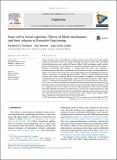From self to social cognition : Theory of Mind mechanisms and their relation to Executive Functioning
Date
05/2015Metadata
Show full item recordAbstract
‘Theory of Mind’ refers to the ability to attribute mental states to oneself and other people (Premack & Woodruff, 1978). This study examined the extent to which ‘Self’ and ‘Other’ belief-attribution processes within the Theory of Mind (ToM) mechanism could be distinguished behaviourally, and whether these separable components differentially related to Executive Functioning (EF) abilities. A computerized false-belief task, utilizing a matched-design to allow direct comparison of self-oriented vs. other-oriented belief-attribution, was used to assess ToM, and a face-image Stroop task was employed to assess EF, within a population of typically-developed adults. Results revealed significantly longer reaction times when attributing beliefs to other people as opposed to recognizing and attributing beliefs to oneself. Intriguingly, results revealed that ‘perspective-shift’ requirements (i.e. changing from adoption of the ‘self’ perspective to the perspective of the ‘other’, or vice versa) across false-belief trials influenced reaction times. Reaction times were significantly longer when the perspective shift was from self-to-other than from other-to-self. It is suggested that the ‘self’ forms the stem of understanding the ‘other’, and is therefore processed regardless of ultimate task demands; in contrast, the ‘other’ perspective is only processed when explicitly required. We conclude that adopting another person’s perspective, even when their belief state is matched to one’s own, requires more cognitive effort than recalling and reflecting on self-oriented belief-states.
Citation
Bradford , E E F , Jentzsch , I & Gomez , J-C 2015 , ' From self to social cognition : Theory of Mind mechanisms and their relation to Executive Functioning ' , Cognition , vol. 138 , pp. 21-34 . https://doi.org/10.1016/j.cognition.2015.02.001
Publication
Cognition
Status
Peer reviewed
ISSN
0010-0277Type
Journal article
Description
This work was supported by the Economic and Social Research Council [grant number ES/J500136/1] in the form of a three-year PhD studentship awarded to Elisabeth Bradford.Collections
Items in the St Andrews Research Repository are protected by copyright, with all rights reserved, unless otherwise indicated.

